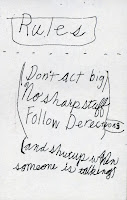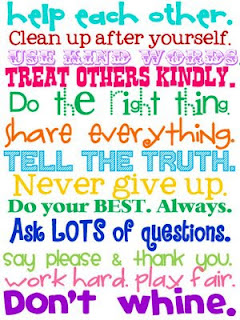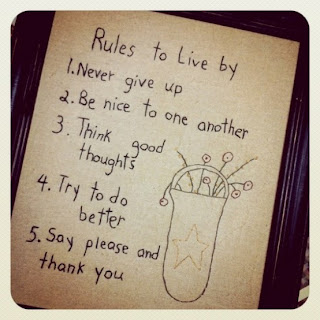In our NEXTgeneration Kids Ministry, we've just begin transitioning every gathering to using the same set of expectations:
- Be kind.
- Be responsible.
- Be respectful.
- Be safe.
You probably have some family rules, whether they are visible or invisible, spoken or unspoken. Whether you have official family rules or not, let me encourage you to make time this week to sit down as a family and talk about what your family's rules should look like.
Why do we need rules?
Rules have existed from the beginning of time. When God put Adam and Eve in the garden, there was one rule: "Don't eat that." Under Moses' leadership, the 10 commandments were established, and soon after, the law of the Old Testament (Leviticus, Numbers & Deuteronomy).
 The Shema is all about our attitude toward God's rules. If we love God with our whole being, we will want to obey him. The Shema commands us to know these rules, and to pass them onto our children. Not casually, but intentionally. The Shema tells us: Talk about them every day. All day. Whenever the opportunity (or teaching moment!) arises. Keep them visible. Don't forsake God's commands!
The Shema is all about our attitude toward God's rules. If we love God with our whole being, we will want to obey him. The Shema commands us to know these rules, and to pass them onto our children. Not casually, but intentionally. The Shema tells us: Talk about them every day. All day. Whenever the opportunity (or teaching moment!) arises. Keep them visible. Don't forsake God's commands!Jesus made clear to us what God's commands look like for us as His followers, when He said that all of the law could be summed up in these two: Love God. Love others.
Why did God create these rules?
We teach the kids that rules serve to protect us and help us get along with one another.
That rule about stopping when the light's red? It protects us (so we don't get hit by another car), and it helps us get along with one another (so we don't make others mad). How about that biggie about not murdering? It protects us (so others don't do the same to us...) and it helps us get along with others (so we don't do stupid stuff when we're mad). At the swimming pool, we don't run because we'll probably slip and fall (no explanation needed).
Tips for creating family rules:
- Let your kids have as much "say so" as you do in this venture. You might be surprised at the rules they want to have in place.
- Rules shouldn't be all about "don't". Use positive language wherever you can.
- Family rules should always be up for review by the whole family, at the right time and place - but on a day to day basis, we all (parents, you too!) follow the rules. (See below.)
- If you want your kids to follow the rules, be the example. If you don't tell the truth all the time, why should they? And if you lose your temper and say something unkind, humble yourself, apologize in a full sentence, ask their forgiveness, and patch it up. It's biblical.
- Expect kids to say they're sorry when they break a rule, and to right a wrong against someone else. If one rule is "Be kind", and your son is constantly antagonizing his sister, it's time to let him think up his consequence, and to make things right with her!
- Keep it simple. There are some REALLY elaborate lists out there that include some really odd rules. ("Smile"? What about when I'm sad? Should I hide it? How about "Have a good attitude" instead.) Avoid too many rules - your 8 year old can not memorize a list of 15 rules!
- Make sure your consequences are fair, consistent, and that you follow through. Rules with no consequences are not rules at all.
Ask some questions:
- Why do we need rules?
- What are some rules you have at school? At church?
- What are some of the rules you think we have at home?
- What rules should we have at home?
- Do something creative together to write out your rules.
- Keep them visible. Hang them up. Post them on the fridge.
Tattoo them on their forearms.Leave stickies on the bathroom mirror. Out of sight? Out of mind.







On a related note, if you need a little help making dinner an enjoyable family time, check out this great blog post called "Rules of Dinner".
What rules do you have for your family? Leave me a comment, or post to our Parents of NEXTgeneration Kids Facebook page.
This is a continuation of a series I'm posting during our study of the book of Romans at Creekside, as we encourage families to memorize the "Shema" together. Previous posts here:


